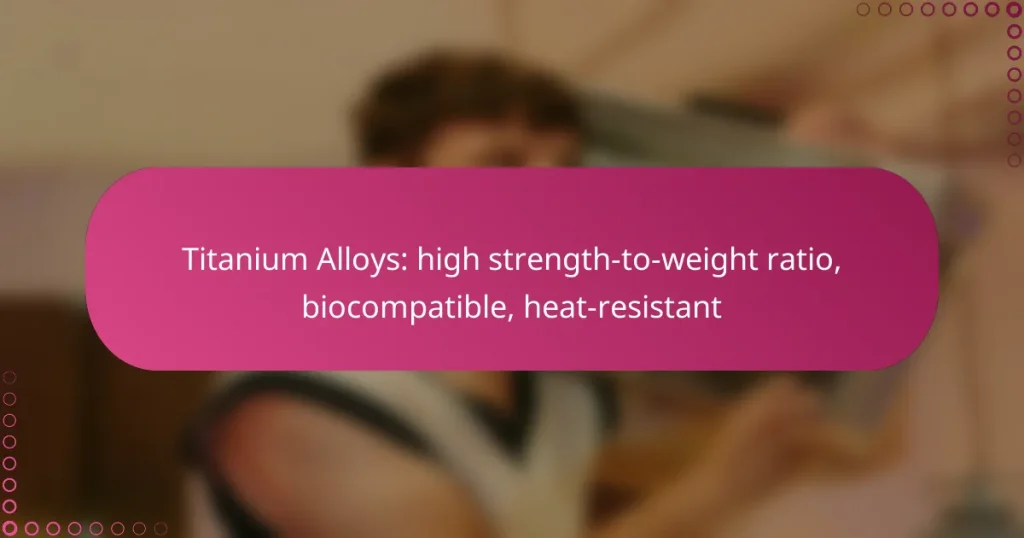Titanium alloys are renowned for their exceptional strength-to-weight ratio, making them a favored material in aerospace and medical applications. Their biocompatibility and heat resistance further enhance their suitability for orthopedic and dental implants, ensuring durability and improved patient outcomes. With superior performance compared to aluminum alloys, titanium alloys stand out in demanding environments where reliability is paramount.

What are the applications of titanium alloys in aerospace?
Titanium alloys are widely used in aerospace due to their high strength-to-weight ratio, corrosion resistance, and biocompatibility. These properties make them ideal for various components that require durability and lightweight characteristics.
Aerospace structural components
Aerospace structural components, such as airframes and wings, benefit significantly from titanium alloys. Their strength allows for thinner designs, reducing overall weight while maintaining structural integrity. This weight reduction is crucial for improving fuel efficiency and performance in aircraft.
Common titanium alloys used in structures include Ti-6Al-4V, which offers excellent tensile strength and fatigue resistance. When selecting materials, engineers often consider factors like load-bearing capacity and environmental exposure to ensure optimal performance.
Engine parts
Engine parts, including compressor blades and casings, frequently utilize titanium alloys due to their heat resistance and lightweight nature. These alloys can withstand high temperatures and pressures, making them suitable for critical components that operate in extreme conditions.
For instance, Ti-6Al-4V is often used in turbine engines, where its ability to maintain strength at elevated temperatures is essential. When designing engine parts, engineers must balance weight savings with thermal performance to enhance overall efficiency.
Fasteners
Fasteners made from titanium alloys are increasingly popular in aerospace applications because they combine strength with reduced weight. These fasteners, such as bolts and screws, are crucial for securing components without adding significant mass to the aircraft.
Using titanium fasteners can lead to weight savings of several percent compared to traditional materials like steel. However, it is important to ensure compatibility with other materials to prevent galvanic corrosion, which can occur when dissimilar metals are in contact.

How do titanium alloys compare to aluminum alloys?
Titanium alloys generally offer superior performance compared to aluminum alloys, particularly in strength, weight, and resistance to extreme conditions. While aluminum is lighter and less expensive, titanium’s high strength-to-weight ratio and biocompatibility make it a preferred choice in demanding applications.
Higher strength-to-weight ratio
Titanium alloys possess a higher strength-to-weight ratio than aluminum alloys, making them ideal for applications where weight savings are crucial without sacrificing strength. For instance, titanium can be up to 60% stronger than aluminum while maintaining a similar weight, which is particularly beneficial in aerospace and medical industries.
This characteristic allows for the design of lighter structures that can withstand greater loads, enhancing overall performance. In practical terms, this means that components made from titanium can be thinner and lighter, leading to better fuel efficiency in aircraft or improved comfort in medical implants.
Corrosion resistance
Titanium alloys exhibit exceptional corrosion resistance, outperforming aluminum in many environments, especially those involving saltwater or acidic conditions. This durability is due to the formation of a protective oxide layer on titanium, which prevents further degradation.
In industries such as marine engineering and chemical processing, this resistance translates to longer-lasting components and reduced maintenance costs. For example, titanium is often used in offshore oil rigs and desalination plants where exposure to harsh conditions is common.
Cost considerations
While titanium alloys provide significant advantages, they come with a higher price tag compared to aluminum alloys. The cost of titanium can be several times that of aluminum, which can be a critical factor in budget-sensitive projects.
When evaluating materials, it’s essential to consider the long-term benefits of titanium, such as reduced maintenance and longer lifespan, which can offset initial costs. In applications where performance and durability are paramount, investing in titanium may yield better overall value despite the higher upfront expense.

What are the benefits of using titanium alloys in medical implants?
Titanium alloys offer significant advantages for medical implants due to their high strength-to-weight ratio, biocompatibility, and heat resistance. These properties make them ideal for applications in orthopedic and dental implants, enhancing patient outcomes and longevity of the devices.
Biocompatibility
Biocompatibility refers to the ability of a material to coexist with living tissue without causing adverse reactions. Titanium alloys are highly biocompatible, meaning they are less likely to provoke an immune response when implanted in the body. This quality is crucial for ensuring that the implant integrates well with surrounding tissues.
Common titanium alloys used in medical applications, such as Ti-6Al-4V, have been extensively tested and meet various regulatory standards for biocompatibility, including ISO 10993. This ensures that they are safe for long-term use in patients.
Reduced rejection rates
Using titanium alloys in medical implants results in lower rejection rates compared to other materials. The unique properties of titanium, including its ability to form a stable oxide layer, promote osseointegration, which is the process where bone cells attach to the implant surface.
Studies indicate that rejection rates for titanium implants are significantly lower, often in the single-digit percentage range. This reliability makes titanium a preferred choice for implants, especially in critical applications like hip and knee replacements.
Durability
Durability is a key benefit of titanium alloys, as they exhibit excellent resistance to corrosion and wear. This longevity is vital for implants that must withstand the mechanical stresses of daily activities over many years.
Titanium alloys can endure extreme conditions, making them suitable for both load-bearing and non-load-bearing applications. Their fatigue strength allows them to maintain structural integrity under repeated stress, which is essential for ensuring the longevity of medical implants.

What are the heat resistance properties of titanium alloys?
Titanium alloys exhibit excellent heat resistance properties, making them suitable for high-temperature applications. They maintain strength and structural integrity even at elevated temperatures, typically ranging from 400°C to 600°C, depending on the specific alloy composition.
High-temperature performance
The high-temperature performance of titanium alloys is characterized by their ability to retain mechanical properties under thermal stress. Unlike many metals, titanium alloys do not become brittle at elevated temperatures, which allows them to perform reliably in demanding environments.
Specific titanium alloys, such as Ti-6Al-4V, are commonly used in applications where temperatures exceed 500°C. These alloys can sustain their strength while being subjected to thermal cycling, making them ideal for aerospace and automotive applications.
Oxidation resistance
Titanium alloys possess superior oxidation resistance, which is crucial for maintaining performance in high-temperature environments. When exposed to heat, titanium forms a protective oxide layer that prevents further oxidation and degradation.
This oxidation resistance is particularly beneficial in applications where exposure to oxygen is prevalent, such as in jet engines. The oxide layer can withstand temperatures up to approximately 800°C, ensuring the longevity of components made from titanium alloys.
Applications in jet engines
Titanium alloys are extensively used in jet engines due to their high strength-to-weight ratio and heat resistance properties. Components such as fan blades, compressor discs, and casings are often made from these alloys to enhance performance and fuel efficiency.
In modern jet engines, titanium alloys can reduce overall weight by up to 30% compared to traditional materials, leading to improved fuel economy and lower emissions. Their ability to withstand high temperatures and resist oxidation makes them a preferred choice in the aerospace industry.

What factors should be considered when selecting titanium alloys?
When selecting titanium alloys, key factors include mechanical properties, cost and availability, and manufacturing processes. Each of these elements plays a crucial role in determining the suitability of a titanium alloy for specific applications, particularly in industries like aerospace, medical, and automotive.
Mechanical properties
The mechanical properties of titanium alloys, such as tensile strength, yield strength, and fatigue resistance, are critical for performance. Alloys like Ti-6Al-4V are known for their high strength-to-weight ratio, making them ideal for applications where weight savings are essential. Consider the specific requirements of your application, as different alloys offer varying balances of strength, ductility, and toughness.
Additionally, biocompatibility is a significant factor in medical applications. Alloys that meet ASTM F136 standards are often preferred for implants due to their ability to integrate well with human tissue.
Cost and availability
Cost and availability can vary significantly among different titanium alloys. Generally, commercially pure titanium is less expensive than alloyed versions, but it may not provide the same level of performance. When budgeting for a project, consider not only the material cost but also the potential need for specialized processing or treatment, which can add to overall expenses.
Availability can be influenced by market demand and supplier networks. It’s advisable to consult multiple suppliers to ensure you can source the required alloy in a timely manner, especially for large-scale projects.
Manufacturing processes
The manufacturing processes for titanium alloys can affect their final properties and performance. Common methods include forging, casting, and additive manufacturing. Each process has its advantages and limitations; for instance, forging can enhance mechanical properties through grain refinement, while additive manufacturing allows for complex geometries.
When selecting a manufacturing process, consider the specific requirements of your application, including tolerances and surface finish. Additionally, ensure that the chosen process is compatible with the selected alloy to avoid issues such as embrittlement or reduced performance.


